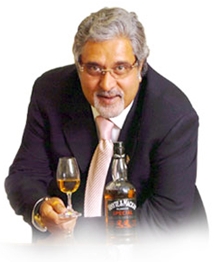Mallya never intended to repay Kingfisher loans, UK court told
05 Dec 2017
The extradition trial of former liquor baron Vijay Mallya, wanted in India on charges of fraud and money laundering, began at a court in London with the prosecution asserting that the embattled Mallya had a "case of fraud" to answer.
 The trial was briefly halted as the courtroom had to be evacuated due to a fire alarm. The 61-year-old businessman and others waited outside the Westminster Magistrates Court during the fire drill.
The trial was briefly halted as the courtroom had to be evacuated due to a fire alarm. The 61-year-old businessman and others waited outside the Westminster Magistrates Court during the fire drill.
Mallya denies any wrongdoing, and according to Reuters, a court document showed his lawyers planned to argue that the case against him was politically motivated and aimed at quelling public anger in India over the accumulation of bad debts by state lenders.
Mallya has had business interests ranging from aviation to liquor. He is also the co-owner of the Formula One motor racing team Force India. He is said to owe around Rs9,000 crore to banks and other lenders in connection with his failed Kingfisher Airlines.
The trial began with the Crown Prosecution Service (CPS), arguing on behalf of the Indian government, presenting its opening arguments in the case which focused on loans sought by Kingfisher Airlines from a consortium of Indian banks.
The opening day's proceedings concluded with the prosecution asserting that they had "shown by virtue of evidence a prima facie case" against Mallya and the hearing should now move to the next phase of whether there were any "bars to extradition".
The CPS detailed "three chapters of dishonesty" by the former Kingfisher Airlines boss - the first being misrepresentations to various banks to acquire the loans, then how he misused the money and finally his conduct after the banks recalled the loans.
Long-haired and bearded, Mallya arrived at the court wearing a dark blue pin-striped suit and gold-rimmed dark glasses. He was mobbed by a large crowd of Indian reporters on arrival, and again later when the building was briefly evacuated because of a fire alarm tht forced him to step outside.
The case against Mallya centres on a series of loans Kingfisher obtained from Indian banks, in particular from state-owned IDBI. Indian banks want to recover a total of about rs9,000 crore that Kingfisher owes.
Mark Summers, a British lawyer acting for India, told the court at the start of the two-week extradition hearing that it was entitled to conclude that he never intended to repay money borrowed by Kingfisher from IDBI in 2009.
''His company was in intensive care ... it was heading in only one direction,'' Summers said. ''As it went down, it was going to sustain huge losses.''
Summers said Mallya faced a choice: to take those losses on himself and his lavish lifestyle, or to palm them off.
''The cost of failure could either be borne honestly by the defendant or they could be passed on banks, in particular a state-owned bank,'' he said.
Summers said the airline had offered the security of its brand name, a further large injection of equity and a commitment to start repaying the capital debt in 2011 when it forecast it would become profitable.
But Summers said these were deliberately misleading or overstated. The loans had been taken out under ''false pretensions'' which were ''supported by valueless securities'', he told the court, and were then not spent how the bank had been told.
A part of the loan was used to clear money owed to other banks, to service a corporate jet used by Mallya, his family and friends, and for cash for Mallya himself, Summers said.
Some was also spent freeing up credit for Kingfisher at another bank. ''Ultimately that money ended up in the defendant's motor racing team,'' Summers told the court.
Despite giving IDBI personal guarantees for the loans, the lawyer said Mallya had been ''squirreling money away to keep it from the bank'' including $40 million he received as part of a deal agreed with Diageo Plc.
Mallya's defence team were due to respond orally later in the hearing.
In a written document prepared before the hearing and seen by Reuters, his lawyers argued that the extradition request should be rejected because of lack of evidence, the ''abusive origins'' of the case, the impossibility of a fair trial in India and detention conditions there being incompatible with British human rights laws.
''It is a case which has been driven in India not by evidential enquiry, but by a populist and misguided sentiment that the sheer size of the losses involved in the collapse of Kingfisher Airlines Ltd (KFA) must be indicative of some criminality somewhere,'' the document said.
''That sentiment has been stoked in India by politicians of every stripe, all of whom stand only to gain from the demonisation of KFA's former senior executives, the bankers who lent to it, and – crucially – the man who is now presented as the embodiment of all the ills of capitalism in contemporary India, Dr Mallya.''
The judge will have to decide whether there is a prima facie case against Mallya and whether the alleged crimes would be offences in Britain as well as India.
The judge, England's Chief Magistrate Emma Arbuthnot, will have to decide whether there is a prima facie case against Mallya and whether the alleged crimes would be offences in Britain as well as India.
The hearing is due to conclude next week.
Judge Arbuthnot and her colleague, Rebecca Crane, at Westminster Magistrates Court have recently rejected two other long-pending extradition requests from India.


















